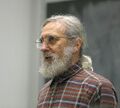Template:Selected anniversaries/April 8: Difference between revisions
No edit summary |
No edit summary |
||
| Line 23: | Line 23: | ||
||1857: Lucy, Lady Houston born ... philanthropist, political activist, and suffragette. Beginning in 1933, she published Britain's ''Saturday Review'', which was best known for its attacks on what the paper labelled the "unpatriotic" National Governments of Ramsay MacDonald and Stanley Baldwin. She has been acknowledged as an aviation pioneer, "the saviour of the Spitfire". Pic. | ||1857: Lucy, Lady Houston born ... philanthropist, political activist, and suffragette. Beginning in 1933, she published Britain's ''Saturday Review'', which was best known for its attacks on what the paper labelled the "unpatriotic" National Governments of Ramsay MacDonald and Stanley Baldwin. She has been acknowledged as an aviation pioneer, "the saviour of the Spitfire". Pic. | ||
File:Edmund Husserl 1910s.jpg|link=Edmund Husserl (nonfiction)|1859: Mathematician and philosopher [[Edmund Husserl (nonfiction)|Edmund Husserl]] born. Husserl will argue that transcendental consciousness sets the limits of all possible knowledge. | File:Edmund Husserl 1910s.jpg|link=Edmund Husserl (nonfiction)|1859: Mathematician and philosopher [[Edmund Husserl (nonfiction)|Edmund Husserl]] born. Husserl will argue that transcendental consciousness sets the limits of all possible knowledge. | ||
| Line 73: | Line 71: | ||
File:Graham Higman.jpg|link=Graham Higman (nonfiction)|2008: Mathematician [[Graham Higman (nonfiction)|Graham Higman]] dies. In mathematics, Higman contributed to group theory. Higman, a conscientious objector, worked at the Meteorological Office in Northern Ireland and Gibraltar during the Second World War. | File:Graham Higman.jpg|link=Graham Higman (nonfiction)|2008: Mathematician [[Graham Higman (nonfiction)|Graham Higman]] dies. In mathematics, Higman contributed to group theory. Higman, a conscientious objector, worked at the Meteorological Office in Northern Ireland and Gibraltar during the Second World War. | ||
File:Donald Sarason 2003.jpg|link=Donald Sarason (nonfiction)|2017: Mathematician [[Donald Sarason (nonfiction)|Donald Sarason]] dies. Sarason made fundamental advances in the areas of Hardy space theory and Vanishing mean oscillation (VMO). | File:Donald Sarason 2003.jpg|link=Donald Sarason (nonfiction)|2017: Mathematician [[Donald Sarason (nonfiction)|Donald Sarason]] dies. Sarason made fundamental advances in the areas of Hardy space theory and Vanishing mean oscillation (VMO). | ||
</gallery> | </gallery> | ||
Revision as of 22:02, 26 January 2022
1461: Mathematician and astronomer Georg von Peuerbach dies. Peuerbach is remembered for his streamlined presentation of Ptolemaic astronomy in the Theoricae Novae Planetarum.
1541: Physician and archaeologist Michele Mercati born. Mercati will be one of the first scholars to recognize prehistoric stone tools as human-made rather than natural or mythologically created thunderstones.
1732: Inventor, astronomer, mathematician, clockmaker, and surveyor David Rittenhouse born. Rittenhouse will become the first Director of the United States Mint, hand-striking the new nation's first coins.
1803: Mathematician Louis François Antoine Arbogast dies. Arbogast was the first writer to separate the symbols of operation from those of quantity. He wrote on series and the derivatives known by his name.
1859: Mathematician and philosopher Edmund Husserl born. Husserl will argue that transcendental consciousness sets the limits of all possible knowledge.
1903: Mathematician Marshall Harvey Stone born. Stone will contribute to real analysis, functional analysis, topology, and the study of Boolean algebra structures.
1904: Mystic and thrill-seeker Aleister Crowley transcribes the first chapter of The Book of the Law.
1911: Physicist Heike Kamerlingh Onnes, discoverer of superconductivity, makes a terse entry in his notebook: Kwik nagenoeg nul ("Mercury[’s resistance] practically zero [at 3 K].").
1913: Physicist Ernst Ruhmer dies. Ruhmer invented applications for the light-sensitivity properties of selenium, including wireless telephony using line-of-sight optical transmissions, sound-on-film audio recording, and television transmissions over wires.
1940: Weapons engineer and army officer Karl Heinrich Emil Becker takes his own life. Becker promoted the integration of scientific research into military goals, notably advanced weapons design.
1959: A team of computer manufacturers, users, and university people led by Grace Hopper meets to discuss the creation of a new programming language that would be called COBOL.
2008: Mathematician Graham Higman dies. In mathematics, Higman contributed to group theory. Higman, a conscientious objector, worked at the Meteorological Office in Northern Ireland and Gibraltar during the Second World War.
2017: Mathematician Donald Sarason dies. Sarason made fundamental advances in the areas of Hardy space theory and Vanishing mean oscillation (VMO).







![1911: Physicist Heike Kamerlingh Onnes, discoverer of superconductivity, makes a terse entry in his notebook: Kwik nagenoeg nul ("Mercury[’s resistance] practically zero [at 3 K].").](/w/images/thumb/8/84/Heike_Kamerlingh_Onnes.jpg/87px-Heike_Kamerlingh_Onnes.jpg)




